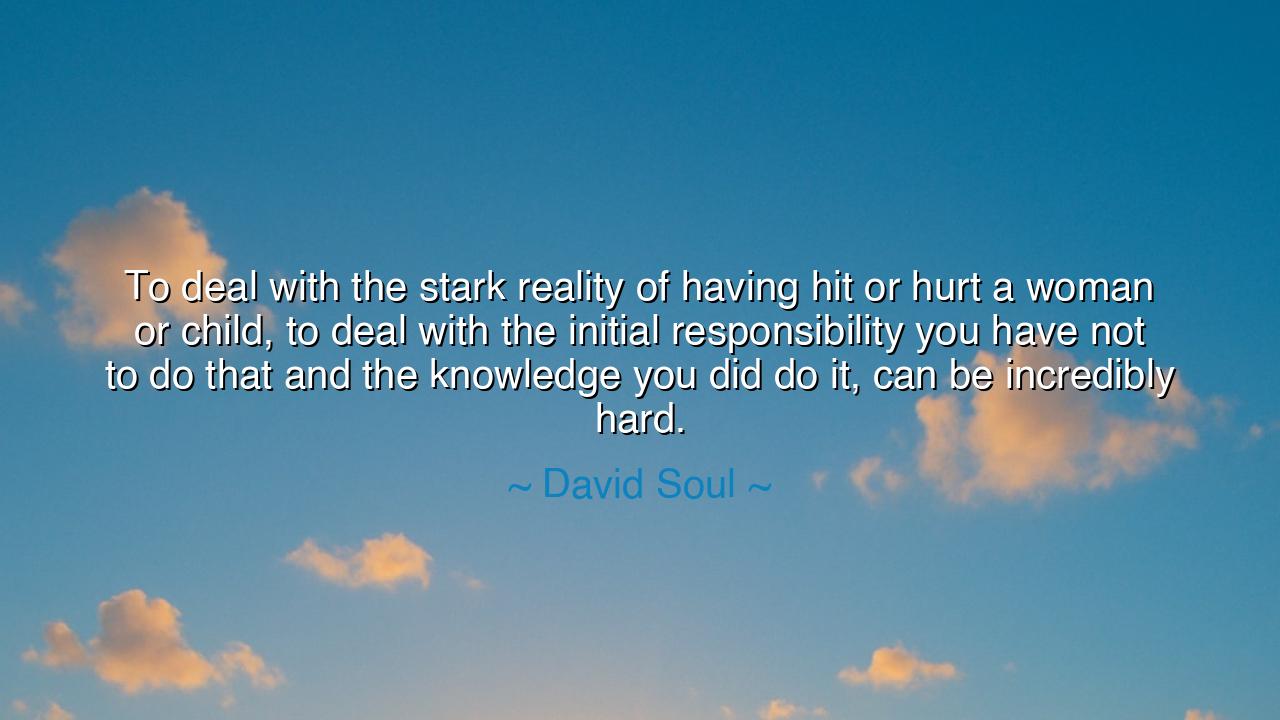
To deal with the stark reality of having hit or hurt a woman or
To deal with the stark reality of having hit or hurt a woman or child, to deal with the initial responsibility you have not to do that and the knowledge you did do it, can be incredibly hard.






The actor and singer David Soul, remembered by many for his fame on the screen but also marked by the shadows of personal struggle, once spoke with sobering honesty: “To deal with the stark reality of having hit or hurt a woman or child, to deal with the initial responsibility you have not to do that and the knowledge you did do it, can be incredibly hard.” These are not the words of pride, nor of self-justification—they are the voice of remorse, the echo of a man who has looked upon his own failures and seen in them the face of truth. Beneath this confession lies a lesson ancient and eternal: that wrongdoing, once done, cannot be undone—but acknowledgment and repentance may still sow the seeds of redemption.
In these words, Soul does not speak as a performer but as a penitent soul—one who has confronted the terrible contradiction of human nature: the knowledge of what is right and the failure to live by it. He speaks of the stark reality, the cold and merciless awakening that comes when one must face the harm they have inflicted on those most innocent and undeserving of pain. To strike a woman or a child is to violate a sacred trust, to betray the gentleness one was meant to protect. Yet the power of Soul’s quote is not in the sin itself, but in the reckoning that follows—in the courage to face the mirror and not turn away.
The origin of this quote lies in the later years of David Soul’s life, when he began to speak openly about his past acts of domestic violence. He admitted his guilt not to excuse it, but to confront it—to remind others that no amount of talent, fame, or power can shield a person from the moral consequences of their deeds. His words emerged from that crucible of shame and awakening that only true repentance can create. For in confessing, he was not seeking pity, but truth; and through that truth, perhaps, a fragment of peace.
There is an ancient story that mirrors this struggle—the tale of King David, who, in the height of his power, took another man’s wife and sent that man to his death in battle. When the prophet confronted him, David was struck not by divine punishment first, but by divine truth. “You are the man,” said the prophet Nathan, and in that moment, David saw himself clearly—his greatness, his corruption, his humanity. Like David Soul, he faced the unbearable weight of his own actions, and he fell upon his knees in remorse. His psalms of repentance remain some of the most heartfelt expressions of guilt and hope ever written. For even kings, even the mighty, must learn that acknowledgment of wrongdoing is the beginning of redemption.
In Soul’s reflection, the knowledge you did do it is what wounds the soul most deeply. The human conscience cannot easily bear the awareness of having harmed the innocent. It tears at the spirit like a silent fire. Yet in that pain lies the potential for growth. The man or woman who refuses to face their guilt remains enslaved to it; the one who confronts it may yet be transformed by it. It is not the act alone that defines us, but the way we rise—or fail to rise—after the act. This, too, is an ancient teaching: that the path to peace runs through the valley of truth, and there is no other way around it.
O listener, learn this hard but holy lesson: remorse is not weakness—it is the doorway to strength. The courage to face one’s faults, to accept full responsibility without excuse, is among the highest acts of the soul. To strike another in anger is to wound your own humanity, but to seek forgiveness and change is to heal both the victim and yourself. The heart that confesses and reforms becomes like tempered steel—stronger for having been broken. Yet this healing cannot come through denial or silence; it comes only through honesty, humility, and the resolve never to repeat the harm.
Let this be your guide: if you have caused pain, do not flee from it. Stand before it, acknowledge it, and let it teach you. Seek forgiveness—not only from others, but from your own conscience—and devote yourself to deeds of compassion that restore what was lost. For as David Soul discovered, the knowledge of one’s wrongdoing can be unbearable, but it is also the very light by which the path of redemption is seen.
Thus, the lesson endures across ages and hearts: to harm the innocent is the lowest act of man; to confront that harm with truth and repentance is the beginning of his salvation. The pain of recognition may burn like fire, but that fire purifies. From it, one may rise—not as who they were, but as who they are meant to become: wiser, humbler, and more deeply human.






AAdministratorAdministrator
Welcome, honored guests. Please leave a comment, we will respond soon